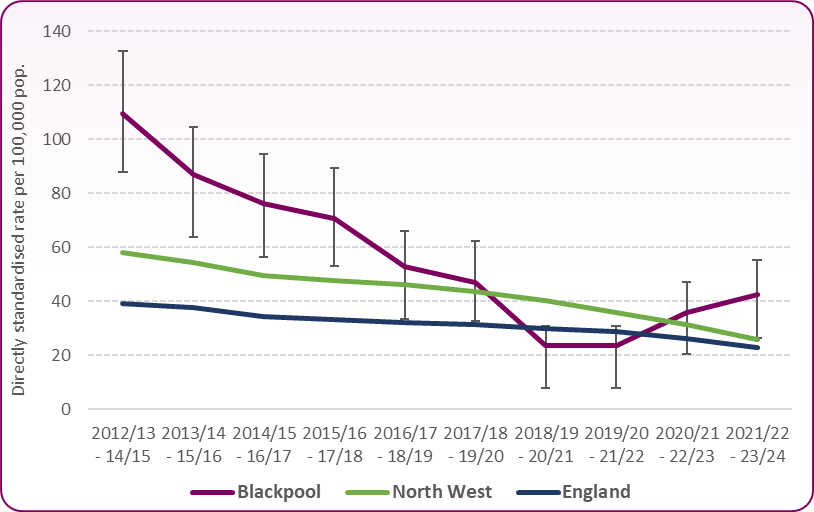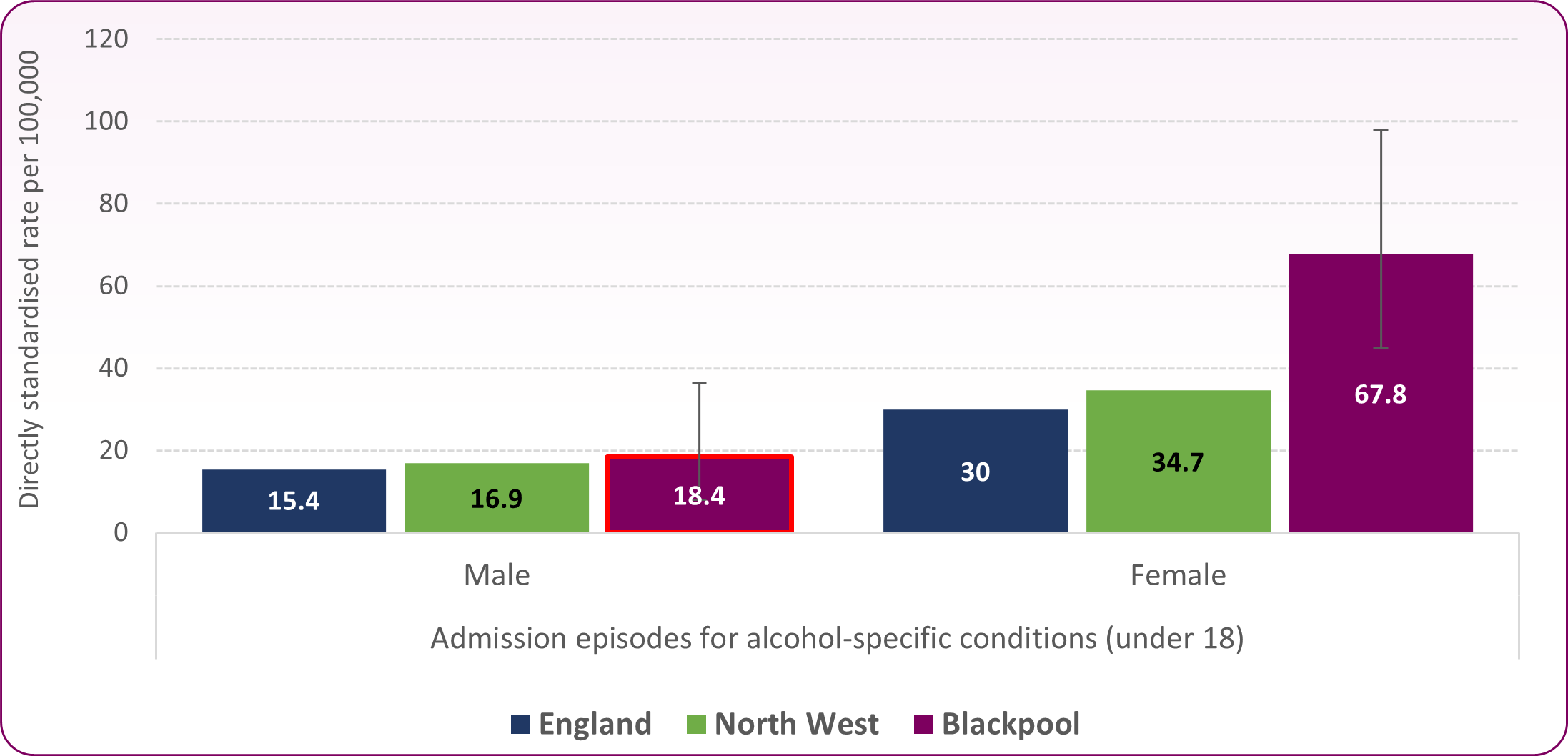Alcohol use in children and young people
Last Modified 07/01/2026 13:16:51
Share this page
Introduction
Whilst the majority of young people do not use alcohol or drugs, and most of those who do are not dependent, drug and alcohol misuse can have a major impact on young people's education, their health, their families and their long-term chances in life. Further information on alcohol-related harm in Blackpool is available in the Alcohol section.
Facts and Figure
Hospital admissions due to alcohol specific conditions
The term 'alcohol-specific conditions' refers to conditions caused wholly by the use of alcohol, including alcohol-induced behavioural disorders and alcohol-related liver cirrhosis.
-
- There were 36 young people living in Blackpool under the age of 18 years who were admitted to hospital due to alcohol specific conditions in the 3-year period 2021/22-2023/24
- The admission rate in Blackpool of 42.5 per 100,000 population is nearly double the national average of 22.6 per 100,000
- As shown in figure 1, between 2012/13-14/15 and 2019/20-21/22 the rate of admissions in Blackpool fell by more than the England rate, and by the end of this period Blackpool’s rate was not significantly different to England. However, the rate has increased since and the gap with England has again become statistically significant
- Young women are over three times as likely to be admitted as young men and admission rates for young women in Blackpool are twice the national average (figure 2). The admission rate for young men in Blackpool is not significantly different to England.1
Figure 1: Trend in alcohol specific hospital admissions in young people aged under 18, Blackpool and England
 Source: DHSC, Alcohol Profile
Source: DHSC, Alcohol Profile
Figure 2: Alcohol specific hospital admissions in males and females aged under 18, 2021/22-2023/24
 Source: DHSC, Alcohol Profile
Source: DHSC, Alcohol Profile
Attitudes and experiences
Blackpool Health Related Behaviour Survey (2024)
The Health Related Behaviour Survey, produced by the School Health Education Unit (SHEU) is a way of collecting robust information about young people’s lifestyles. Data from the 2024 survey shows that in Blackpool:
Blackpool Primary school pupils - Years 4 and 6 (ages 8 and 11)
-
- 6% of boys and 2% of girls in Year 6 said that they drank an alcoholic drink (more than just a sip) in the week before the survey.
- 88% of pupils say that they don’t drink alcohol.
- 2% of pupils reported that their parents ‘never’ or only ‘sometimes’ know if they drink alcohol.
- 1% of pupils drank beer or lager, 1% alcopops and pre-mixed spirits and 1% spirits in the week before the survey. This may represent a change from the 2019 survey when 1% drank wine and 1% cider and could be indicative of the availability of different types of alcohol.
Blackpool Secondary school pupils - Years 8 and 10 (ages 12 and 15)
-
- 8% of Year 8 and 20% of Year 10 pupils drank alcohol on at least one day in the week before the survey
- 1% of Year 10 pupils bought alcohol in the last 7 days from an off-licence who should only sell to over-18s
- When asked for their main reasons for drinking 16% of drinkers said it was ‘often’ or ‘always’ ‘to socialise and have fun’, 9% of drinkers said ‘to get drunk’
- 8% of pupils reported that in the last year they had been drunk at least ‘once or twice a month’
Blackpool Further Education Students in Year 12 (ages 16 - 17)
-
- 35% of boys and 32% of girls in year 12 drank alcohol on at least one day in the week before the survey
- 5% of Year 12 students bought alcohol in the last 7 days from a pub/nightclub, 5% bought it from an off- licence and 1% from a supermarket; all these places should only sell to over-18s
- 14% said their parents bought or gave it to them and 12% said their friends/family over 18 did
- 25% of students reported that in the last year they had been drunk at least ‘once or twice a month’
When looking at the changes in alcohol data between previous SHEU surveys, there has been a downward trend since 2007 locally in alcohol use amongst primary and secondary school aged children in the survey. When comparing the Blackpool data to the wider SHEU survey sample, there is no significant difference between young people in Blackpool and their comparators from other areas in terms of their alcohol usage.
Alcohol drinking prevalence and consumption by young people in England (2023)2
The Smoking, Drinking and Drug Use among Young People in England in a regular survey which has taken place since 1982. It is conducted with pupils in school years 7 – 11
-
- The proportion of young people reporting that they have ever had an alcoholic drink declined from 62% in 2003 to 37% in 2014. There was a change of methodology in 2016 which means that results since cannot be directly compared
- In 2023 using the new methodology the proportion of young people who have ever drunk alcohol is estimated at 37%. This has declined from 43% in 2016
- The proportion of pupils in 2023 who say they have ever had an alcoholic drink increases by age from 15% at age 11 to 62% at age 16. This proportion is broadly similar for girls and boys but is higher (74%) for pupils with another gender identity
- White pupils were more likely to have had an alcoholic drink in the last week, with 10% saying they had done so. This compares to 2% or less for Asian, Black and other ethnic groups
- The use of e-cigarettes was found to be associated with the likelihood of having had a drink in the last week
- 26% of pupils who drank in the last week are estimated to have drunk 15 units or more
- There are differences in the type of drinks consumed by gender. Boys were more likely to drink beer, larger or cider, whilst girls were more likely to have consumed wine, spirits or alcoholic pre-mixed drinks
- 7% of pupils who pupils who drank in the last 4 weeks said they had been drunk.
Local Services
The Blackpool Adolescent Service offers flexible one-to-one treatment, support, advice and information for young people, parents, carers and professionals around drug and alcohol misuse. As well as one-to-one work with young people, the service also offers group work for young people who are actively misusing substances to raise their awareness and to offer support. Referral is by self-referral or can be made by other services or professionals. Support can be accessed by telephoning 01253 754840 (9am - 5pm Mon-Fri).
Figure 3 shows the number of young people in treatment for alcohol in Blackpool. The number in treatment declined from 135 in 2010/11 to 3 in 2019/20. The number of young people in treatment for alcohol has subsequently increased and there were 27 young people in treatment in 2023/24.3
Figure 3: The number of Blackpool young people in treatment for alcohol misuse, 2009/10 to 2023/24
 Source: NDTMS, Young people profile, 2025
Source: NDTMS, Young people profile, 2025
National and local strategies
The Blackpool Alcohol Prevention and Harm Reduction Strategy 2024 - 2027 highlights the many areas of our lives touched by alcohol misuse in Blackpool and sets out the action plan for reducing alcohol-related harm.
NICE guideline [NG135] Alcohol interventions in secondary and further education (August 2019) provides guidance for interventions in schools and further education colleges to prevent and reduce alcohol use among children and young people aged 11 to 18.
The Blackpool Children, Young People and Families Partnership Plan 2024 – 2029 provides context around the lives of children and young people in Blackpool and the interventions which can help to improve outcomes.
The Blackpool Health and Wellbeing Strategy 2024 – 2028 recognises the role that alcohol plays in the health of Blackpool residents and sets out what local partners will do to address alcohol risk and harms.
The 10 Year Health Plan for England includes national actions to reduce the harm associated with alcohol consumption.
References
[] DHSC, Fingertips | Alcohol Profile
[] NHS Digital, Alcohol drinking prevalence and consumption: 2023, Oct 2024
[] National Drug Treatment Monitoring System, Young people profile, 2025